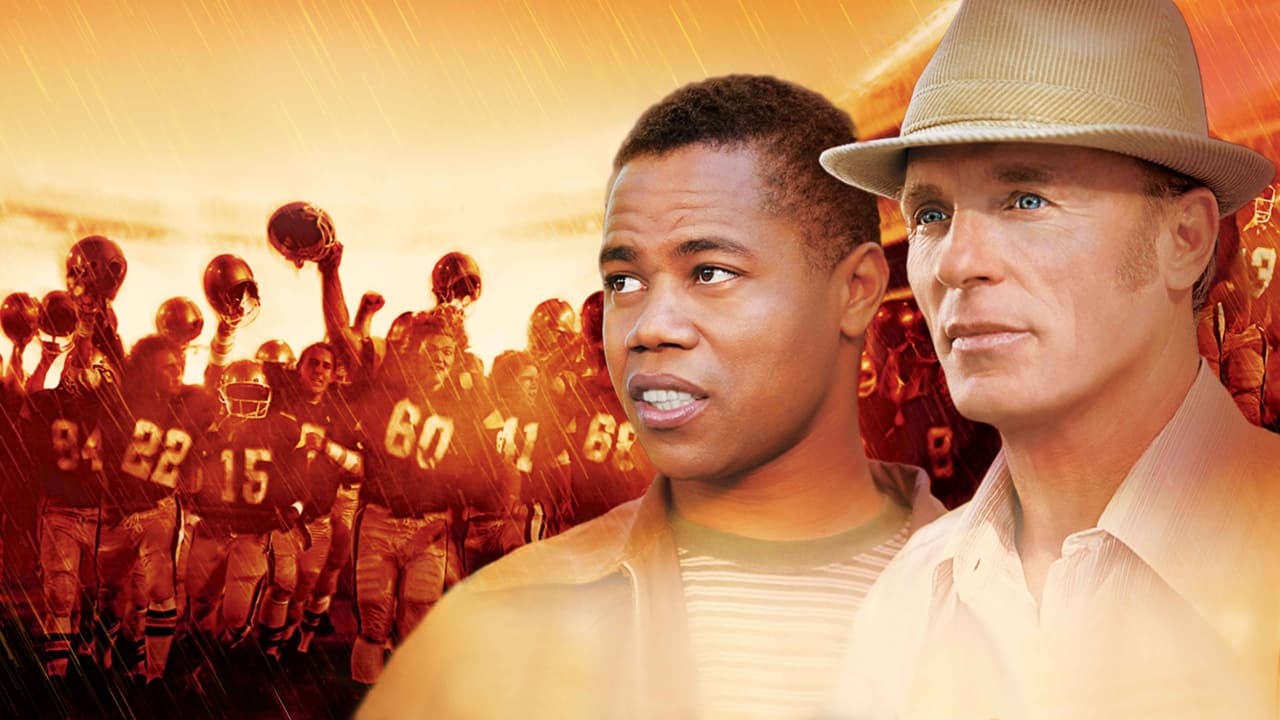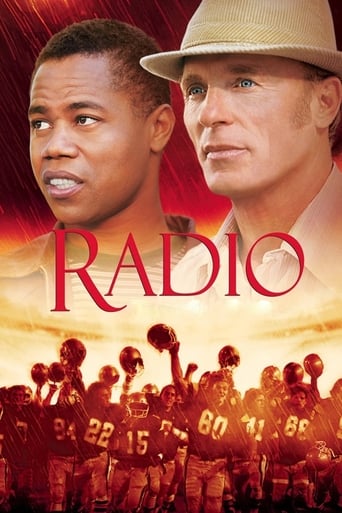

Great movie I can also relate to this movie I myself have a disability but its Autism. I watched this when it was in the movie theater back in 2003 I loved it so much. I would watch it in class also because my teacher loved that movie so much. Another thing I would like to point out is Cuba Gooding JR and ED Harris worked really well together I love the movie so much. I just watched the movie on Netflix and I still love that movie I felt bad for Radio the way he was treated by some people but then latter it got all better I hope anyone who watches this movie can love it just like I do. Its great and a very well put together film watching it is a great idea if anyone here sees this watch it the movie is worth your time. Its a great movie I never get bored of watching it all though I had not watched it in years I re watched it and I still love it great movie if you buy it its worth it if you see it its worth your time.
... View MoreIt's 1976 in Anderson, South Carolina. Harold Jones (Ed Harris) is the high school football coach. His wife Linda (Debra Winger) thinks he's not paying enough attention to their daughter (Sarah Drew). James 'Radio' (Cuba Gooding Jr.) is a mentally handicapped man who pushes a shopping cart around town. After taking one of the team's football, the star ballplayer and his friends tie him up and terrorize him. Coach takes Radio under his wing. It's not always easy as the team doesn't live up to expectations.There are different ways to criticize Cuba's performance. It could be seen as a showy thing meant for the awards season. Cuba could be dismissed as unable to do more with the character. I think he does a fine job. It's definitely not award winning but at least he's pushing his acting range.The major problem for me is the concentration on the coach and Radio. It needs to have a POV from someone else. There are a couple of possibilities. Johnny Clay would be an interesting choice especially with his father Frank. He's set up for a redemption storyline. The side characters need more time. The story is too simplistic when there is easy drama underneath the story. A more fleshed out story for the teenagers would be much more compelling. It shows when the daughter is able to pull the deepest emotions from the story.
... View MoreThe movie Radio inspired by true events takes place in 1976 show the love and compassion a local high school football team and eventually the entire town shows to a young handicapped man that was once tormented by the players of the Anderson High School football team. Coach Harold Jones is played by Ed Harris. While James Robert Kennedy is played by Cuba Gooding Jr. The setting for this movie is Anderson, South Carolina. In the beginning of the movie you see "Radio" pushing his cart through out town marching to the beat of his on drum. Through out this time the movie jumps to the football practice that is taken place during the opening credits. The movie takes no time jumping into the hard and emotional scene of seeing Radio tied up in the equipment shed as the football team tortures him. There is no clear cut reason for the team torturing Radio but you do see an interaction between Radio and a player in the beginning of the movie that could hint to the reason why the players decided to torment him. Coach Jones realizes that his team is up to no good to only find Radio tied up in the shed. Coach Jones then takes Radio home to his mother where he finds out about Radio's past and that he is intellectually disabled. Coach Jones and Radio begin spending more time together, which eventually leads to Radio helping out with the football team and joining high school for the first time in his life. Radio receives his nickname from Coach Jones essentially for the simple fact that he is often seen listening to the radio, as well as collecting radios and fixing them.Radio is accepted as a part of the football team and is loved by the town. This is a very warming experience since the town was not very accepting of Radio being a part of the football in the beginning. Cuba Gooding Jr. does an amazing job encompassing the role as Radio. His acting abilities were truly put to the test with this movie and he passed with flying colors. During the closing credits there is actual video of James Robert Kennedy (Radio) and the viewer could hardly tell the difference between the two. Ed Harris also does an amazing job of playing a compassionate yet hardnosed coach that is essential to completing this movie. This movie is very moving and emotional. There is a lot of highs and lows through out but at the end it will leave the viewer feeling good and uplifted.
... View MoreAs the film opens, we see Radio coasting down a hill in a shopping cart (or buggy, as they are called in the South), having a great time. And you can't help thinking: that looks like fun; why didn't I ever try that? It is also the way the Sports Illustrated story on Radio, which is the foundation for this movie, opens.Yes, there really was a Radio, and still is. And there really is a town called Anderson that did something wonderful, and that makes me proud to be an American. But they didn't do it out of any sense of political correctness; this all started in 1964, when it still took courage in some places for whites to extend a hand to blacks.Why did they do this? It is not quite clear from the 1996 SI article, which talks about some of the cruel childish pranks played on Radio, though not by school athletes; but otherwise there is no sense of the conflict found in the film. The film condenses a story lasting nearly 50 years now into one year, the first year.Presumably, there was some conflict due to race and disability in those early years, but from what information is available that all soon disappeared. The school and the community took to Radio rather smoothly and quickly -- not the right stuff for a dramatic screenplay, or a believable one! But what caused a Southern town to do the right thing? It all started with Coach Harold Jones reaching out to Radio. When one person who is respected in the community takes a fearless stand for what is right, it is easier for others to follow, and harder for the racists to get any traction. This was nothing new for Coach Jones, contrary to the movie account: as a youth he defended a disabled neighbor from bullies with his fists.Now is a good time to revisit Radio, after the sickening perversion of school sports by a poisonous mix of pedophilia and money at Penn State's football program. Radio is a reminder that this is not what school sports is about. If you watch carefully, you will see that the movie is not just about Radio. It gives you a sense of what goes into making a successful team, football or basketball, the training, the discipline, the teamwork, the tactics. You see how the school and the community are involved in identity and emotions. And you see that coaches Jones and Honeycutt are trying build adults of good character out of their players.No, they are not making a mascot out of him. You can see that a genuine sense of compassion, of seeing Radio as a human being despite the obscuring cloud of his disabilities, develops in those who get to know him, and in the whole community. And this is not just the film; you can see in the end footage, that this is real, and you can read about it. Far from a mascot, Radio became a teacher, teaching the community to help those with disabilities, and to look beyond race. His lesson spread beyond Anderson, as he traveled with the teams and his reputation preceded him. Radio was only left off the team bus once, because they ran out of seats. Hannah lost that day. Radio was the first on the bus from then on. And they won that season, contrary to the film.Radio is a moving film that provides a moral lesson for us all that continues to resonate today. Be kind to others, not because of what others might think, but because it is the right thing to do, even if it is unpopular. If you do it, others will follow.This lesson is not just about disabilities or race. Think about that disturbed young man who allegedly opened fire in a movie theater. The way we treat people, especially when they are children, is important. If other children or teachers had reached out when he was a child, perhaps things would have been different. Think back to when you were a child; was there some schoolmate you picked on, perhaps because others were doing the same? Do you wish you could turn back the clock and stand up against the other bullies to defend him, or make friends with him? That's what Radio is about: students (and adults) learning to extend a hand of friendship to someone who is different, who is being picked on cruelly.Radio, the movie, obviously has a moral lesson to impart. It is not heavy handed, and it is not blatantly manipulative. It builds a certain dramatic tension without indulging in the exaggeration that might make it a move powerful movie. But it retains its credibility. Even if the writers have built a fictionalized account based on real incidents and variations of events, they have created a natural and believable story and dialog that seems consistent with the truth.I have seen Radio several times now, and it holds up well. What might not strike the viewer at first is how strong are the performances of Sarah Drew and Riley Smith. Drew's emotional response to the death of Radio's mother is remarkable. Smith's acting is fine, but that he delivers some excellent football and basketball action, too, is impressive.I watched Radio shortly after watching Guess Who's Coming to Dinner, made in 1967. It is worth noting that Radio shows Coach Jones watching All in the Family, a comedy that ridiculed racism. In America, films and TV helped shift public values on topics such as race. But Coach Jones took his stand in 1964, before all that. Ultimately, it all starts with individual action.I would like to say thank you to Coach Jones, Coach Honeycutt, the people of Anderson, and most of all, to James Robert Kennedy, for reminding us what America really stands for.
... View More